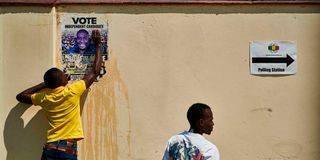UN voices concern as tensions rise over disputed Zimbabwe elections

A man removes an election campaign poster next to a polling station in Zvishavane, Zimbabwe on August 22, 2023.
United Nations Secretary-General Antonio Guterres has expressed concern over the volatile post-election situation in Zimbabwe, after the opposition rejected the disputed re-election of President Emmerson Mnangagwa.
President Mnangagwa was declared the winner of the 23-24 August presidential election on Saturday with 52.6 per cent of the vote. His main rival, Nelson Chamisa, who won 44 percent, refused to accept the result, saying the vote was rigged.
Civil society organisations say security agents hounded local election observers to prevent independent verification of the results.
Forty-one observers from the Zimbabwe Election Support Network (ZESN) and the Election Resource Centre (ERC) were arrested on 23 August, accused of trying to announce unofficial results.
The spokeswoman for UN Secretary-General Antonio Guterres, Florencia Soto Nino-Martinez, said on Sunday that her boss was closely following developments in Zimbabwe following the disputed elections.
"He is concerned about the arrest of observers, reports of voter intimidation, threats of violence, harassment and coercion," Ms Nino-Martinez said in a statement.
"The Secretary-General calls on political leaders and their supporters to reject all forms of violence, threats of violence or incitement to violence, and to ensure that human rights and the rule of law are fully respected.
"The Secretary-General calls on political actors to resolve any disputes peacefully through established legal and institutional channels and urges the relevant authorities to resolve any disputes in a fair, expeditious and transparent manner to ensure that the results truly reflect the will of the people."
President Mnangagwa, 80, said those aggrieved by the result would have to challenge it in court as he denied accusations by Mr Chamisa of the Citizens Coalition for Change (CCC) that he had rigged the election.
Five years ago, the Constitutional Court dismissed a petition by the 45-year-old opposition leader accusing his rival of rigging the first election after the 2017 coup that toppled longtime ruler Robert Mugabe.
Foreign observer missions said last week's elections failed to meet regional and international standards after chaos marred the first day of voting, with polling spilling over into the next day. Observers were also alarmed by the harassment of election observers who were providing an independent check on the results.
ZESN and ERC said on Sunday that their observers were still being hounded by the authorities, amid reports that one of them had his house set on fire.
"Since election day, ERC and ZESN have continued to receive reports of observers and staff being targeted, threatened and assaulted, including one incident where an observer's house was torched hours after the announcement of the presidential election results," the two organisations said in a statement.
"This continued intimidation and silencing by state actors of anyone who can provide verification and transparency of the election results fundamentally undermines their credibility and the credibility of these elections."
Tensions have risen in Zimbabwe since the announcement of the presidential election results on Saturday night, with police saying they have been deployed across the country to quell any protests.
"The Zimbabwe Republic Police is fully aware of attempts by some political activists to mobilise groups of people to move in small numbers and come to Harare for purported briefings and popcorn demonstrations under the guise of verifying citizens' votes," police spokesman Assistant Commissioner Paul Nyathi said.
"This has been given credence by some social media posts obtained by the police, where some individuals and groups are inciting violence and making threats aimed at causing alarm and despondency among Zimbabweans."
Following the disputed 2018 elections, six people were shot dead by soldiers on the streets of Harare during protests against the delayed release of the presidential election results.
Zimbabwe has a long history of disputed elections dating back to the Mugabe era, where fraud and rigging were used to manipulate polls.





